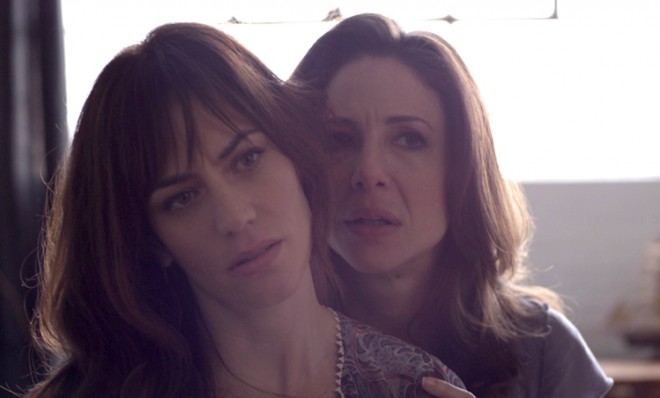Girls on Film: Concussion isn't really about lesbian prostitution
Stacie Passon's new film, which follows a woman who turns to the sex trade after a head injury, is far more relatable than its premise might sound


A free daily email with the biggest news stories of the day – and the best features from TheWeek.com
You are now subscribed
Your newsletter sign-up was successful
There are plenty of adages like "never judge a book by its cover" that warn us against superficial snap judgments. But that doesn't stop us from making them — especially in our approach to entertainment.
Films are generally boiled down to their quickest, easiest summary: A poster, a trailer, or a one-sentence plot summary. What is handy for the straightforward, however, becomes problematic for the complex — which has become apparent with this week's limited release, Concussion.

Stacie Passon's impressive directorial debut, which follows a woman who struggles with the monotony of her long-term lesbian marriage, has had an uncanny sense of timing. It debuted at the Sundance Film Festival just as President Obama announced his support for gay rights in a history-making inaugural address in January, and hits theaters just as the controversial (and higher-profile) lesbian drama Blue is the Warmest Color, which won this year's Palme d'Or, is heading toward its own release. But despite these benefits, Concussion continues to draw skepticism for a bare-bones summary of its core premise: A woman whose head injury leads her to lesbian prostitution.
The Week
Escape your echo chamber. Get the facts behind the news, plus analysis from multiple perspectives.

Sign up for The Week's Free Newsletters
From our morning news briefing to a weekly Good News Newsletter, get the best of The Week delivered directly to your inbox.
From our morning news briefing to a weekly Good News Newsletter, get the best of The Week delivered directly to your inbox.
At its simplest, and most superficial, Concussion focuses on Abby (the remarkable Robin Weigert), a 40-something woman who reevaluates her life when she receives an accidental and nasty blow to the head. Suddenly, her suburban life of motherhood, mommy-blogging, and spin classes cannot fill the emptiness in her life and her sexless marriage. Eager for passion without emotional commitment, she seeks out sex workers, which leads her to a secret life of prostitution.
"Though willing prostitution definitely has its onscreen merits," wrote Interview in a Trailer Face-Off article, "it seems a little far-fetched. We prefer the premise of Blue is the Warmest Color, which is universally relatable regardless of sexual orientation. [...] On-screen sex is always more enjoyable when it hasn't been paid for. […] No contest here, the lesbian drama that cannot be missed is Cannes winner Blue is the Warmest Color. Come for the 10-minute sex scene, stay for the touching, believable romance."
Anyone judging the two films based on their superficial qualities is likely to come to the same conclusion. A film about a girl coming of age and dealing with the emotional highs and lows of passion and love sounds more believable than a drama about a loving housewife who becomes a secret prostitute for sexual fulfillment. But as we should know by now, an audience's ability to relate to a plot is always linked to how the filmmaker treats it — no matter how seemingly far-fetched it is.
This applies to all stories. When recently discussing Aquaman — a superhero who can telepathically communicate with marine life — DC Entertainment's Geoff Johns said, "It's more interesting to find out what drives him and motivates him. How are those powers a metaphor we can relate to?" It is this mindset that has made our obsession with superhero movies not just about epic action sequences, but also humanity, whether it's the grimness of The Dark Knight's Gotham City or a group of Avengers needing to refuel with shawarma after an epic showdown. It's the mindset that makes movies such a beloved art form — and a mindset that starts to twist the impact of Concussion and Blue is the Warmest Color.
A free daily email with the biggest news stories of the day – and the best features from TheWeek.com
Blue is the Warmest Color is the latest entry in the age-old exploration of women as mystical, unknowable creatures. It's a philosophy director Abdellatif Kechiche asserts both with the male intellectuals musing about mystical female ecstasy in the film, and his own insights, which he relayed to The New York Times. "It's almost a feeling of anguish, a feeling of desolation, in not being able to really grasp what it is that a woman feels," he says. "When I perceive things that I can't explain, I try to picture them through images, through an interaction or an encounter."
What Kechiche fails to understand, however, is that voyeurism doesn't give us answers. Blue is the Warmest Color doesn't even ask the questions Kechiche is trying to answer — and because he filters it through his own confusion without questioning motivation and drive, the characters cannot rise above his confusion and superficial tropes.
Passon's Concussion, however, uses sex and infidelity to explore love and passion — the why that eludes Kechiche — which makes the seemingly outlandish surprisingly relatable. It isn't that Passon is a woman and therefore knows women, but that she doesn't treat women as an other — which is usually the barrier between good and poorly drawn female characters. Abby is an extension of Passon not in deed, but impulse: Passon really was hit in the head with a ball, and she wrote the screenplay to work through the dissatisfaction it unleashed in her own life. The plot becomes relatable and engaging because it is steeped in the director's own humanity — not an untouchable, mystic mindset.

Abby's prostitution makes sense in Passon's world because she explores Abby's motivations rather than condemning her. Abby is an everywoman struggling to reconcile her commitments and genuine love with her dormant passions and personality — the precipice between who you need to be as a wife and mother, and what your singular thoughts and desires are as a person. Those questions may not lead the average person to prostitution — but they are questions to which the average person can relate.
Concussion is compelling because it isn't a story of prostitution, but a story about how prostitution offers an outlet for one engaging character. To fix her life, Abby gets back to work as a decorator and house-flipper, and in doing so, she finds a space she can flood with her own passions — not just personally, but sexually. She creates her idea of a perfect apartment, which doubles as her own space to explore her sexuality.
And her sexuality isn't a series of risqué clients having NC-17 sex, but a persuasive mix of motherly impulse and care. Abby meets every client to make sure they can genuinely connect, and her appointments range from the audaciously sexual to the charmingly intimate as she helps an older woman fight a latent fear of desire, and gives a lonely young woman her first sexual experience while trying to instill confidence in the girl. Emotional connection isn't melodramatically black and white for Abby. Rather than an all-or-nothing proposition of meaningless sex or wildly emotional passion, Abby offers emotional connection without romantic love. Prostitution for Abby, therefore, isn't a desperately degrading or sexually obsessive act, but rather a way to explore many manifestations of passion and sexuality.
It's all about intent. What seems unbelievable on the page becomes believable in Passon's hands, and what seems "universally relatable" in Blue is the Warmest Color becomes restrictive in Kechiche's. If you're obsessed with the other, your questions will never be answered, and the "other" will never really be relatable. But if you obsess over the why, and explore it, you can make anything believable.
Concussion is one of the year's must-see movies because it challenges us to think, ask, and rethink what we believe we already know. In Passon's hands, cinema isn't just a voyeuristic experience snooping into the beauty and ugliness of life; it is an exploration of life and what drives all of us. From beginning to end, it makes us ask questions, which is the only way we can ever truly attempt to understand anything.
Girls on Film is a weekly column focusing on women and cinema. It can be found at TheWeek.com every Friday morning. And be sure to follow the Girls on Film Twitter feed for additional femme-con.
Monika Bartyzel is a freelance writer and creator of Girls on Film, a weekly look at femme-centric film news and concerns, now appearing at TheWeek.com. Her work has been published on sites including The Atlantic, Movies.com, Moviefone, Collider, and the now-defunct Cinematical, where she was a lead writer and assignment editor.
-
 How the FCC’s ‘equal time’ rule works
How the FCC’s ‘equal time’ rule worksIn the Spotlight The law is at the heart of the Colbert-CBS conflict
-
 What is the endgame in the DHS shutdown?
What is the endgame in the DHS shutdown?Today’s Big Question Democrats want to rein in ICE’s immigration crackdown
-
 ‘Poor time management isn’t just an inconvenience’
‘Poor time management isn’t just an inconvenience’Instant Opinion Opinion, comment and editorials of the day
